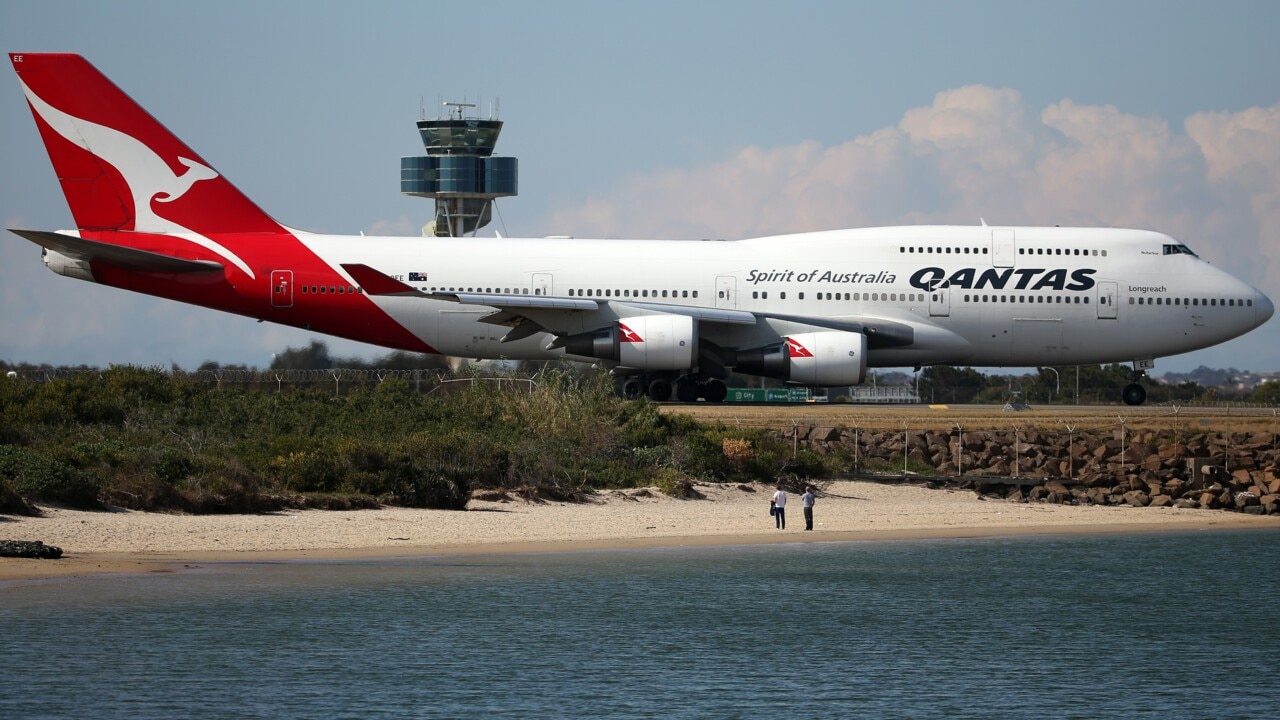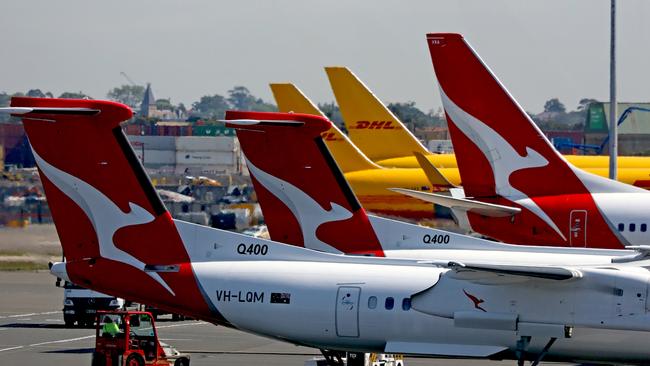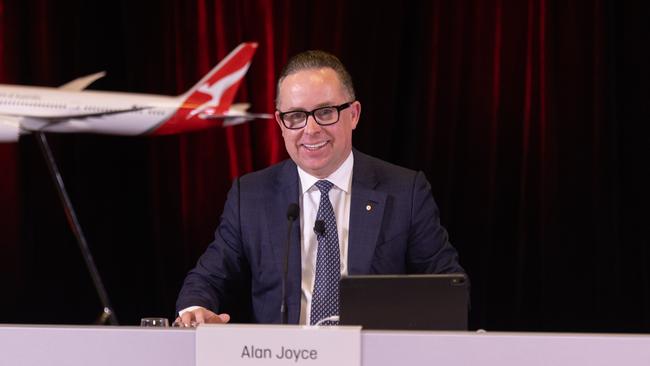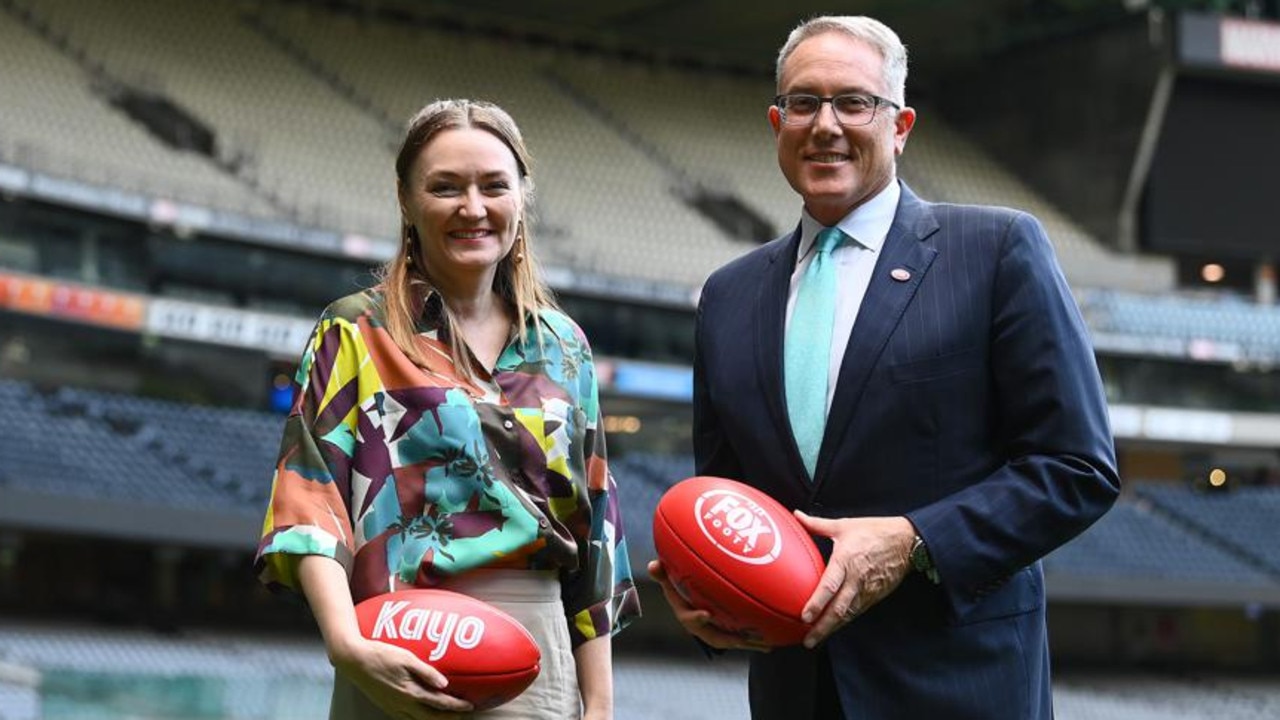Pay, flight delays and cyber security questions from Qantas shareholders at AGM
Shareholders have been told ‘capable airline executives’ are hard to come by in response to questions about Alan Joyce’s pay and a likely successor.

Business
Don't miss out on the headlines from Business. Followed categories will be added to My News.
Qantas shareholders have overwhelmingly backed chief executive Alan Joyce’s $4m in incentive awards, despite a year marred by customer complaints, in a lively annual general meeting on Friday.
Chairman Richard Goyder also defended generous bonuses set to inflate Mr Joyce’s pay to as much as $13.8m next year, saying capable airline executives were hard to come by, as he and Mr Joyce were grilled by shareholders for more than two hours.
“Executive remuneration is a challenging item (and) one of the challenges we’ve got is we’re competing in a very competitive market for capable executives, and capable airline executives is a much tighter market,” Mr Goyder said.
“Salaries are competitive and provide a greater incentive for performance.”
Shareholders quizzed the airline’s board on everything from Alan Joyce’s pay and likely successor to performance issues and cyber security at the meeting in Sydney.
Mr Goyder doubled down on the issue of succession planning, saying Mr Joyce would continue to serve as chief executive until at least the end of 2023.
“In due course we will sit down and talk about what that time frame looks like,” said Mr Goyder.
“The board is confident Alan has developed very capable executives (to be considered for the job) and the board will scan externally as well.”
Mr Joyce responded to questions about performance issues such as flight delays particularly in relation to low fares partner Jetstar.
A shareholder who had recently experienced two short-notice flight cancellations by Jetstar was told the carrier had “more than its fair share of challenges”.
“There can be a lot of reasons for cancellations that occur late and they occur across the industry,” said Mr Joyce.
“Extreme wind in Sydney is a problem because of the runway closures that occur which means there’s a restricted amount of aircraft that can land. In those instances, cancellation have to occur.”

He assured another shareholder that Qantas would have more aircraft operating on international routes next year, with A380s returning to service and the delivery of three new Boeing 787s.
On the subject of high airfares, Mr Joyce pointed out demand continued to outstrip supply with Qantas keeping 20 aircraft in reserve to help minimise delays.
“Even in this world we are seeing very low airfares. To give you some examples, Jetstar will sell 5 million seats at under $100 each and Qantas will have 2 million seats at under $150,” Mr Joyce said.
“On international we are adding capacity faster than our competitors and people should be actively looking for new fares.”
The threat of cyber security breaches such as the Optus disaster was very much on Qantas’s radar with the airline investing heavily to protect its customers’ information data.
Mr Goyder said they had “robust systems in place” but it was not something they could afford to be complacent about.
Mr Joyce added that Qantas’s approach to cyber security was the same as aviation safety and any incident that occurred around the world commanded their close attention to see what lessons could be learned.
All resolutions put to the AGM were passed including the re-election of Mr Goyder who used the meeting to reinforce the company’s opposition to multi-employer bargaining.
Promoted by unions as the key to wages growth, Mr Goyder said multi-employer bargaining would effectively lead to centralised wage setting.
He made the point Qantas workers are on average paid above $100,000 a year, and 85 per cent are covered by agreements negotiated with unions.
“We’re concerned that the proposed changes effectively dismantle the enterprise bargaining system that has served Australia well for decades,” said Mr Goyder.
“This kind of system will have little regard for the fact different companies have different needs. And that will have a massive impact on productivity, growth and (in the longer term) the ability to pay more.”

He said the Minister’s willingness to make amendments to the bill was welcome and joined with other big employer groups to ask that more time be taken for “the legislation and its consequences to be genuinely debated”.
Mr Goyder also highlighted Qantas’s $3bn turnaround, with the airline expecting to post a half year underlying profit of up to $1.3bn.
Meanwhile, Qantas released new performance data for October showing how far it had come since a “low point” in July.
Flight cancellations were at 2.2 per cent of services, down from 6.2 per cent in July and the rate of mishandled bags was “steady” at six in every 1000, down from 12 in 1000.
The statement said on-time performance had lifted from 69 per cent of departing flights in September to 74 per cent in October.
“Qantas aims to keep on time performance in the mid-70s for the remainder of the calendar year, factoring in the forecast for more extreme weather events in some parts of the country,” said the statement.
“This aligns with the circa-75 per cent on-time performance recorded by the national carrier in November and December 2019.”
The October figures took in QantasLink as well as Qantas but not low fares partner Jetstar which has struggled with high levels of flight cancellations and delays in recent months.
The result could lift Qantas ahead of Virgin Australia in the on-time performance rankings but not Rex which has consistently led the pack on punctuality.
Virgin Australia was streets ahead in the mishandled bags’ stakes however with about 2.4 in 1000 going astray in October down from 3.7 in July.
And Virgin Australia also laid claim to picking up the phone faster than Qantas with most customers waiting under one minute to speak to a person.
In comparison Qantas has reduced its call waiting times from over an hour, to about six minutes.
Qantas shares closed up 0.3 per cent at $5.97 each.
Originally published as Pay, flight delays and cyber security questions from Qantas shareholders at AGM





